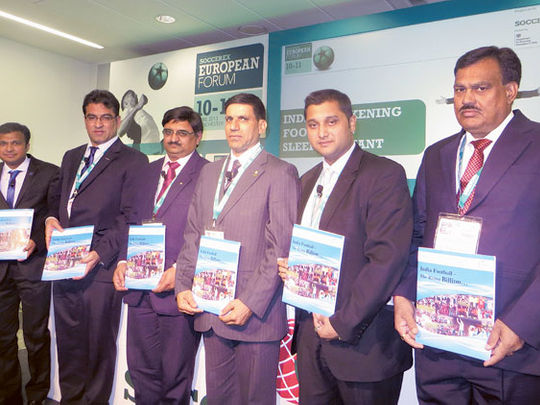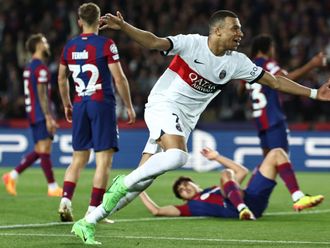
Manchester: With new manager Manuel Pellegrini now installed at Manchester City as Roberto Mancini’s replacement, expectations have never been higher at the Etihad Stadium. Pellegrini has been tasked with bringing domestic and Champions League success and, as he will discover, City’s determination to gain a foothold in India’s burgeoning football market is well under way.
A highly influential Indian delegation was invited to the Etihad Stadium for a presentation on the club’s global vision. The journey from Manchester Central, where the delegation was heavily represented at the 2013 SoccerEx European Forum, might have been relatively short, but the journey to develop football and unearth talent in India has been anything but.
Recognising the part they envisage in establishing their club in India, City’s chief operating officer Tom Glick, their head of the International Department Omar Berrada and the club’s ambassador, Mike Summerbee, were on hand to explain some of the facts behind the rise of the 2011/12 English Premier League Champions and how City have affected the league’s established order.
Glick and Berrada stressed that City remain committed to exploring how they could best fit into the development of football in the world’s largest democracy. Like the rest of us present, former City player Terry Phelan sat fascinated at the transformation of the club, famously labelled the “noisy neighbours” by Sir Alex Ferguson.
Earlier, the secretary of the All India Football Federation (AIFF) — the governing body for football in India — Kushal Das, exclusively told Gulf News of the varying challenges football faces in India.
“I think our focus is of course on the player development, so we need to create a product, which means Indian football needs to be upgraded. The only way we can do it is by investing in youth development, the creation of academies so that we have the right talent coming through,” he said.
“That is the focus. Of course the I-League [the professional league in India] also needs to be revamped because that is the commercial property of the federation. You need money to do your other programmes. So the league should move up in terms of quality as well as visibility for us to earn that commerce. It’s a little bit of a chicken and egg story — we need players to upgrade the league for our development programme, but at the same time we want the league to look to move up so that we have the money to continue our development programme.”
With officials from the Federation of Indian Chambers of Commerce and Industry (FICCI) and India’s only strategic football consultancy, Libero Sports, among the delegation at the Etihad stadium, City recognise the importance of a strong presence in India, and they are not alone.
Fellow Premier League giants Arsenal, Chelsea, Liverpool and Manchester United are among clubs to have set up coaching clinics or academies in India with the aim of tapping into the potentially huge Indian talent pool.
La Liga sides Barcelona and Real Madrid, as well as Serie A’s AC Milan and Inter Milan, have already established a foothold, but current Champions League holders Bayern Munich went one step further when they chose to play Oliver Kahn’s farewell match against I-League side Mohun Bagan in Kolkata in 2008. More than 120,000 fans attended that match and, unsurprisingly, the German side has perhaps established the most in-depth commitment to Indian football, and that is something that Das sees as crucial.
“What it does is it certainly raises the profile of Indian football. I mean people suddenly see these top teams playing and the interest level goes up significantly. In that sense, it really helps. By and large we need much more commitment from the big clubs. Do they really want to participate in India’s development?” he said.
“Youth development was definitely an overlooked area and we tried to rectify that. It probably should have been done a few years back and we’d probably had a pipeline where the talent would’ve been developed. We’d have players not only capable of playing in the league, thereby improving the quality, but also perhaps playing in the European leagues as well.
“If you have two or three Indians playing in the top European Leagues, it’s a game changer. We did not have a development programme that produces the players who can participate at this level. Hopefully in the next four or five years we will have players who can generate or create talent who would be capable of playing in these top European leagues.”
Rajpal Singh is FICCI’s director and head of sports and youth affairs. Back at SoccerEx 2013, his talk titled ‘India: Awakening Football’s Sleeping Giant’ ensured there was standing room only as an enthralled audience listened to him speak of the potential business opportunities, already grasped by Nike and Adidas. “For every 1,100 sportsmen, India needs 55 coaches, 15 track and field experts, 25 sports medicine experts, 50 trainers and 22 sports nutrition experts,” he said. Recognising the need to reach out to global businesses, Singh urges companies not to try to go it alone in an often complex marketplace.
NEW APPROACH
That view is shared by Libero Sports’ youthful duo, managing director Sukhvinder Singh and strategy director Neel Shah. They represent the new face of a strengthening Indian business community who, armed with MBAs and a passion for football, are keen to help cement India’s future place at football’s top table.
A country traditionally gripped by cricket has woken up to football like never before, aided by a younger generation now accustomed to seeing EPL (English Premier League) stars Sergio Aguero, Jack Wilshire and Robin van Persie regularly on their screens. That, agrees IMG senior vice-president Jefferson Slack, has ensured a new approach from the multinationals, although he did admit to being surprised when he got to learn about India and its love for football.
“Not having known much about India before, I’ve discovered wonderful people and, on a personal basis, it’s a country I’ve fallen in love with. The potential is certainly even greater than we imagined when we started talking about this a couple of years ago. We concluded our deal in December 2010 and the challenges are significant,” says Slack, who cited the nationwide Pepsi billboards featuring Didier Drogba, Frank Lampard and Fernando Torres facing up to M.S. Dhoni, Virat Kohli and Harbhajan Singh under the slogan ‘Now the game changes’ as another step forward in India’s developmental programme.
India’s bid to host the 2017 U17 World Cup was welcomed by Fifa. But with such a steep learning curve ahead of them, Fifa has asked the AIFF to observe this year’s edition in the UAE in October and November and its organising committee, to gain experience and practical insight on Fifa’s strict guidelines and expectations.
Before the Indian delegation departed the Etihad Stadium, Pete Bradshaw, City’s head of infrastructure development and corporate responsibility, presented the Etihad Campus project, which aims to provide the local community with opportunities to get involved with the club at all levels. Multiple pitches and education facilities on this once industrial wasteland will catapult the club into the forefront of home-grown talent development, something the AIFF is no doubt keen to learn from in the search for progress for football in India.
— The writer is a sports journalist based in the UK










